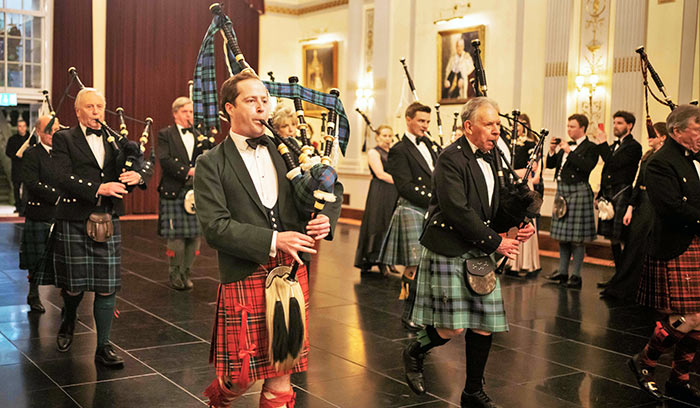
Given the scale and scope of its journalism, readers of Piping Press must surely have their finger on the pulse of most parts of our piping world, but there is one small historic corner that has stayed largely under the radar since its inception in 1971.
That corner, in London’s West End, is occupied by the Pinstripe Highlanders who have been meeting and playing their pipes together for 51 years. Thanks to a conversation with the Editor at the Archie Kenneth Quaich, we thought we would take the opportunity to let the rest of the world know of our existence.
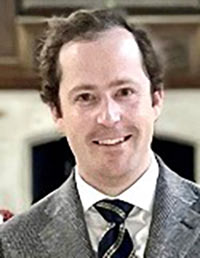
By Gordon Tughan-Jones
We are an amateur piping society, but we do not insist on amateur status. We do not have drummers or uniforms. We wear our own tartans and we don’t march very well.
We try to make an enjoyable sound but we would not force people to change their chanters. We enjoy meeting up regularly, though there are no requirements as regards regular attendance.
We do, however, have a tie. It has the same pattern as the King’s Own Scottish Borderers and the Royal Scottish Pipers’ Society ties – only in gold on navy – so it sometimes receives confused looks.
The Pinstripers came into existence as the result of a chance meeting between Pipe Major John Roe (Scots Guards) and Lord Wrenbury. It was agreed that Wrenbury, who had learnt the pipes at school but who felt he was rusty, would take weekly lessons from Roe in Wrenbury’s office overlooking St Paul’s Cathedral.
For obvious reasons, these sessions could hardly remain a secret. News spread and before long the group expanded to more than a dozen pipers with a wide range of abilities. For the first few years many of us did in fact wear pinstriped suits, hence our name. Fortunately, bowler hats had just gone out of fashion.
As generations of Scots Guards pipers have attested, John Roe was a superb musician, teacher and leader. Most of the band’s members had learned the pipes at school but decided to leave them in the box once they realised that practising them in a London flat did not win them many friends. John would welcome pipers whatever their experience or abilities, take them back to basics, and mould them into something resembling a musical unit.
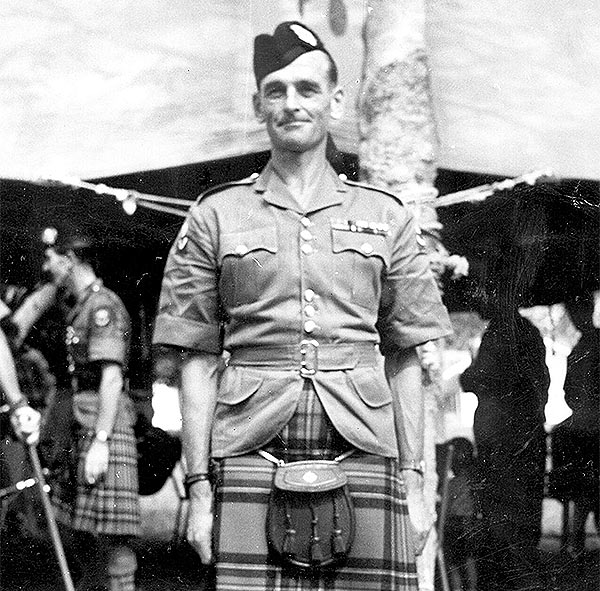
He composed the 6/8 March ‘Kate Wrenbury’ for the Pinstripers in the mid-1970s and it has remained our ‘anthem’. Much of our repertoire has inevitably been based on the Scots Guards books. At one chanter practice John instructed a Pinstriper Kim Fraser to play Struy Lodge (from SG Vol. 1). Kim, whose family’s estate included this property, replied: ‘I can’t Pipe-Major, it’s burned down!’ To which John shot back: ‘Well, play what’s left of it!’.
After he passed away in 1994 the baton was taken up by another excellent ex-Scots Guards Pipe Major, Roger Huth, and in recent years we have been very fortunate to receive regular guidance from two successive Pipers to the Sovereign, firstly P/M Richard Grisdale, and now his successor P/M Paul Burns.
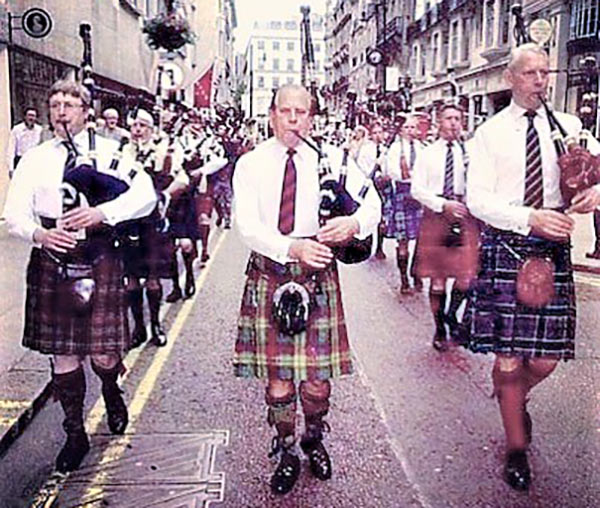
Finding a venue in central London for a dozen or more enthusiastic pipers was never going to be easy. After Lord Wrenbury retired we moved from his law firm and met in a series of locations: pubs, offices, art galleries, a school, the headquarters of the Church of England (!) and West End clubs, our current meeting place being the Caledonian Club.
A branch of the Pinstripers (the Northern Echelon), comprising members who have returned from exile in London, meets regularly in and around Edinburgh. This started due to a chance meeting of exiled members at John Roe’s Memorial in the Guards’ Chapel.
They have met over the years in members’ houses, offices and mainly in the Medical School at Teviot Place, Edinburgh. Every two years, the Northern and Southern Echelons meet, alternately in London and Edinburgh, to hold a dinner and individual piping competitions.
Over half a century Pinstripers have performed at a huge variety of events: National Trust events, weddings, funerals, charitable fundraising, and, once, remembrance at the battlefield of Waterloo (the Belgian one, not the daily rush hour).
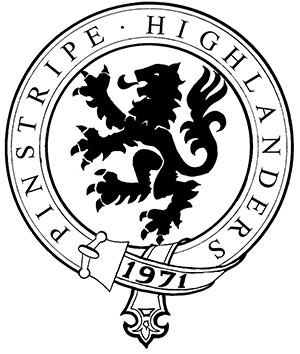
One performance, memorable for all the wrong reasons, was at Evensong in the sublime setting of the Chapel of King’s College, Cambridge. To cut a very long story short, we attempted without the benefit of a proper dress rehearsal to march two abreast along an aisle which was too narrow for us and our drones, and we were forced to break step and proceed in a crab-like fashion. Meanwhile the sound of our pipes swirled 80 feet upwards to the fan-vaulted ceiling and came back to haunt us a couple of bars later. The Chapel was built 500 years ago, and we were the first Highland pipers ever to play there: we suspect that we will also be the last.
But the main event, which we work towards all year, is the Highland Society of London’s annual Highland Ball. Originally held at Claridge’s, then at the Banqueting House and currently at the Plaisterers’ Hall in the City, we have played at this for most of our existence, marching through the kitchens past chefs preparing kedgeree and gloriously emerging into the hall to march up and down at the interval, before performing a set and marching off to Kate Wrenbury, all normally well after midnight.
Inevitably, after half a century the ranks of original members are thinning out, but while the survivors may have moved on to easier chanter reeds their enthusiasm is undimmed. What is really encouraging is that the society has recently attracted a new generation of younger pipers, remarkably similar in age profile, keenness and ability to the early members back in the 1970s.
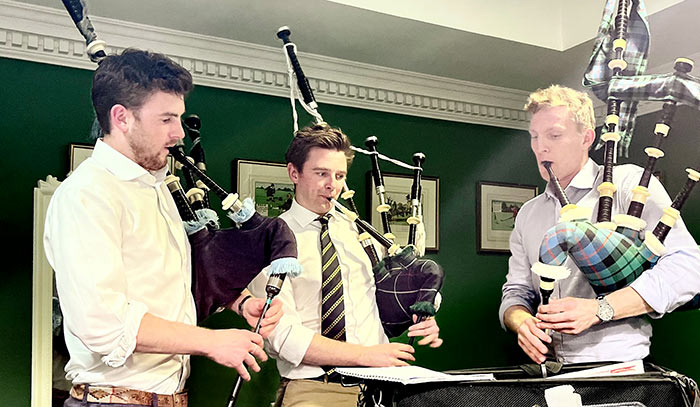
Our message is that any piper living in or passing through the London area is welcome to come and join us. There is no audition and the atmosphere is relaxed and welcoming. Everyone is encouraged to join in the practice chanter session, followed by blowing the pipes and then retiring to the bar, but nobody is forced to indulge in any of these activities.
If anyone would like to give it a try they should complete the form in the ‘Contact’ section of the website at www.pinstripehighlanders.com for details as to when and where we meet. Our exploits can also be followed at www.instagram.com/the_pinstripe_highlanders/.
















It’s good to hear that the Pinstripers are still active. I was a visitor a few times times about 20 years ago at the invitation of Hugh MacMillan and Roger, when they practised at an art gallery in St. James. I also took part in the march along Jermyn Street, too far back to be in the photo: I recall Roddy (R.S.) MacDonald took part too, before he emigrated to Japan. I live in NE Surrey and teach piping in my retirement from school teaching.
Thanks Gordon – fascinating article!